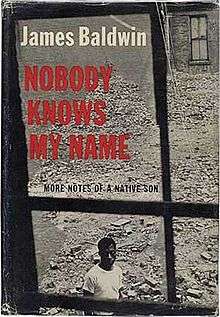Nobody Knows My Name
 First edition cover | |
| Author | James Baldwin |
|---|---|
| Country | United States |
| Language | English |
| Genre | Essays |
| Publisher | Dial Press |
Publication date | 1961 |
| ISBN | 0-679-74473-8 |
Nobody Knows My Name: More Notes of a Native Son is a collection of essays by the American author James Baldwin. The collection was published by Dial Press in July 1961, and like Notes of a Native Son, Baldwin's first collection published 1955, it includes revised versions of several of his previously published essays, as well as new material.
Essays
"The Discovery of What It Means to Be an American" originally appeared in The New York Times Book Review, January 25, 1959; "Princes and Powers" in Encounter, January 1957; "Fifth Avenue, Uptown: A Letter from Harlem" in Esquire, July 1960; "East River, Downtown: Postscript to a Letter from Harlem" in The New York Times Magazine, March 12, 1961, with the title "A Negro Assays the Negro Mood"; "A Fly in Buttermilk" in Harper's, October 1958, with the title "The Hard Kind of Courage"; "Nobody Knows My Name: A Letter from the South" in Partisan Review, Winter 1959; "Faulkner and Desegregation" in Partisan Review, Fall 1956. "In Search of a Majority" was adapted from an address delivered at Kalamazoo College, February 1960, and first appeared in print in Nobody Knows My Name. "The Male Prison" originally appeared in The New Leader, December 13, 1954, with the title "Gide as Husband and Homosexual." "Notes for a Hypothetical Novel" was adapted from an address delivered at an Esquire magazine symposium on "Writing in America Today" held at San Francisco State College, October 22–24, 1960, and appeared in print for the first time in Nobody Knows My Name. "The Northern Protestant" was originally published in Esquire, April 1960, with the title "The Precarious Vogue of Ingmar Bergman." Two of the three sections of "Alas, Poor Richard" originally appeared in periodical form: "Eight Men" in Reporter, March 16, 1961, with the title "The Survival of Richard Wright," and "The Exile" in Encounter, April 1961, with the title "Richard Wright" (a French translation of "Richard Wright" appeared in Preuves, February 1961, entitled "Richard Wright, tel que je l'ai connu"). The concluding section, "Alas, Poor Richard," was published for the first time in Nobody Knows My Name. "The Black Boy Looks at the White Boy" originally appeared in Esquire, May 1961.
Critical reception
"To take a cue from his title, we had better learn his name."
Irving Howe, the New York Times, July 2, 1961.[1]
In the New York Times, Irving Howe called it a "brilliant new collection of essays".[1]
References
- 1 2 Howe, Irving (July 2, 1961). "Nobody Knows My Name". New York Times.